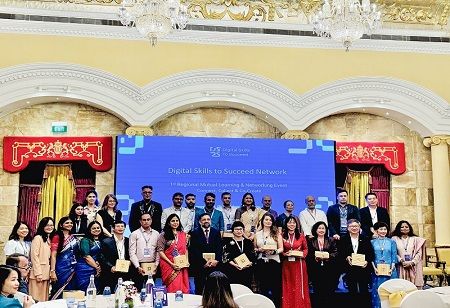The German International Cooperation Agency (GIZ) Conference themed 'Digital Skills to Success' was organized in Bangalore, India, attended by 75 experts and academics from 16 universities in Vietnam, India, Bangladesh, and Germany. Among those attending the conference were Assoc. Prof. Dr. Phan Thi Bich Nguyet, Chairwoman of the Strategy and Policy Advisory Council, and Assoc. Prof. Dr. Trinh Thuy Anh,legates learned what the digital skill needed to be developed in a context of globalization. Vice Rector of the College of Technology and Design at UEH. Both delegates learned what the digital skill needed to be developed in a context of globalization.
The conference emphasized the growing importance of digital skills to higher education, particularly for non-technical fields, in a highly digital world today. Experts discussed how private sectors can develop human resources who are future-ready, and challenges and opportunities this may pose for countries such as Bangladesh, Vietnam, and India. As far as the fast pace of digital transformation goes, there has never been such a need for collaboration on the part of universities, governments, and businesses for the effective improvement of digital capacities of new generations.
Discussions also emphasized the development of community capacity in knowledge-sharing platforms. To support this endeavor, GIZ created micro-credential courses accessible via an e-platform and free to train persons with improving their digital skills and preparing them for the new requirements of the global economy. This exercise aims to foster capacity-building and provide one of the most critical learning experiences among the citizens of the world.
The rapid development of the world and technology has made learning, especially self-learning ability, a key to success. What is the future of learning in today's digital world?. The experts discussed learning in conventional classrooms (classroom learning) and distant learning, the differences, challenges and development potential, as well as the need for innovative tools, listed as micro-credentials, in which learners always play a central role. While traditional universities invest in facilities, teaching staff, technology and modern methods to improve training quality, distant learning will depend on the platform and designed learning materials. GIZ's initiative to offer micro-credit courses, which aim to connect and to link learning modules through suggested pathways for learners, is an effective way to promote knowledge sharing and enhancement for the community.
Associate Professor, Dr. Nguyen Thu Thuy - Director of the Department of Higher Education said: "The Vietnamese Ministry of Education and Training will soon introduce a digital competency training framework for implementation in universities. This will play a facilitative role in promoting digital competency in Vietnamese higher education".
In addition, the workshop discussed hot topics like How to build a co-creation cooperation model between schools and businesses to be able to exploit resources from society for training future human resources; how to develop digital capacity for students studying non-technology-related majors, based on an application-oriented training strategy and innovation in the digital economy. The experts proposed creative learning pathways as an effective tool for future learning, in which participants will share, interact and collaborate in an integrated pathway.
The micro-credential courses are emerging as an effective mechanism for improving digital capabilities and expertise in specialized fields. The experts' discussions pertaining to curriculum and learning pathways for the micro-credential courses on topics that revolve around Digital Entrepreneurship, Data, and AI seem to form a strategic plan for preparing the future workforce with knowledge and practical skills for the digital age. Based on this vision, University of Economics Ho Chi Minh City is now co-leading the development of a 'Digital Entrepreneurship' course and presenting new educational opportunities for learners in building up their digital competencies to react effectively to this growing demand for such expertise.

